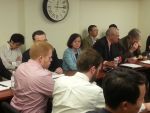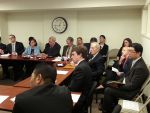Japan's Nuclear Energy Policy: Institutional Influences and International Implications
October 8, 2016
Given the tremendous aftermath of 3/11 in Japan and throughout the world, it has been widely accepted that exogenous shocks, particularly momentous crises such as Fukushima, have been the main drivers of Japanese nuclear energy policy. However, a more thorough historical examination of Japan’s nuclear policy since the 1970s oil shocks reveals that major external disturbances have coexisted with gradual institutional change. In fact, from the 1970s till the Fukushima accident, nuclear power in Japan was on an upward trend—the Kyoto Protocol and the high priority placed on climate change buttressed new nuclear build, and consequently, the substantial leverage of the utilities obstructed progress towards power sector reform and unbundling, which the Japanese industry argued would make nuclear generation unviable. In the post-Fukushima era, many uncertainties remain, including possible regulatory reform and the contentious issue of Japan’s nuclear fuel cycle program. Although the potential of a nuclear revival in Japan remains open, it is also possible that the new Japanese nuclear regulatory authority unintentionally moves Japan to an entirely new energy system by setting overly burdensome standards for plant operation. Fears that the latter scenario could emerge have raised concerns within Japan that the country could lose its nuclear knowledge base and its position as the major US civil nuclear partner in the region.



















